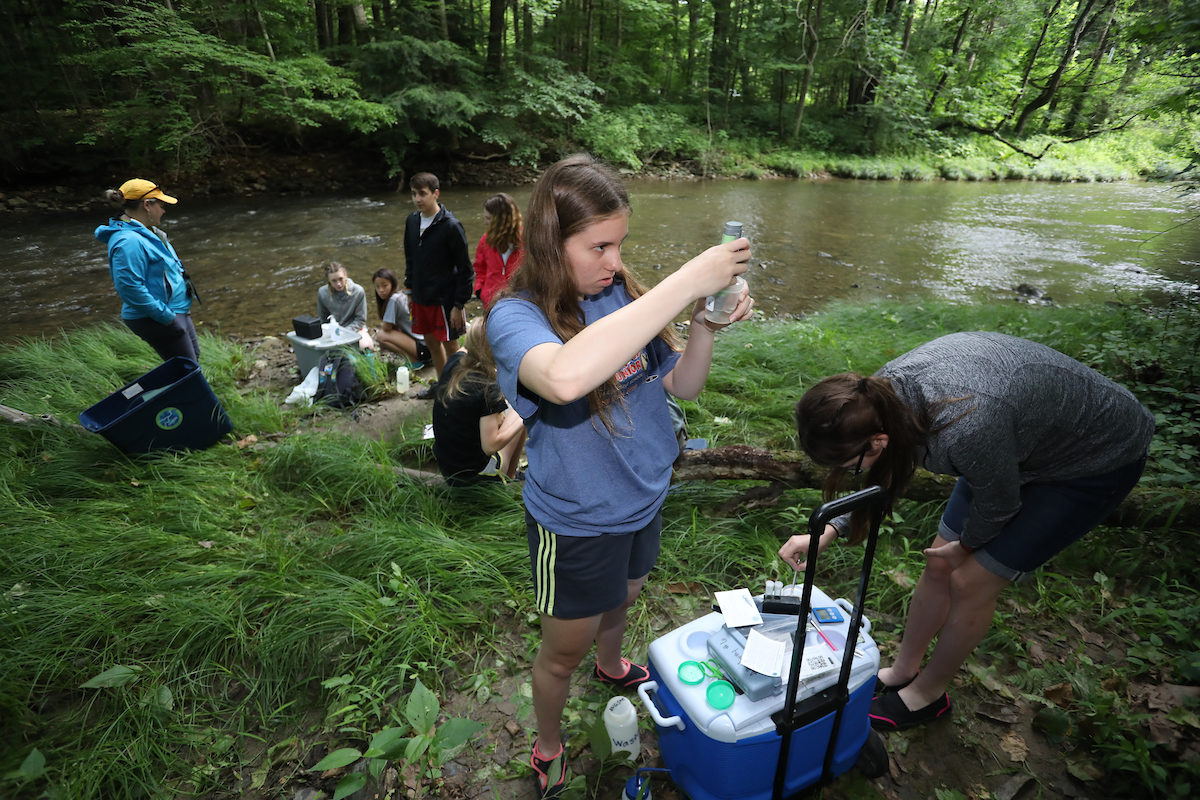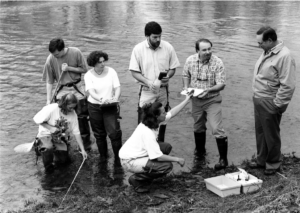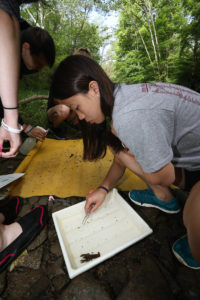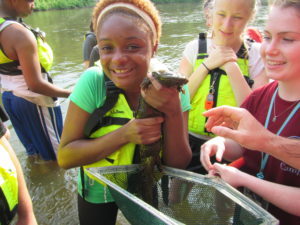
Allegheny’s Creek Connections Celebrates Silver Anniversary of Aquatic Exploration
It’s been 25 years since Associate Professor of Biology and Environmental Science Jim Palmer first waded into the waters of French Creek with a group of curious Meadville-area high school students in search of hellbenders and other aquatic curiosities.
That day marked the beginning of Allegheny College’s hugely successful Creek Connections program, which has educated well over 100,000 junior-high and senior-high students since its inception. The program was founded in 1995 as the French Creek Environmental Education Project by a team of Allegheny faculty and six students.

“With a two-year seed grant from the Toyota USA Foundation and support of local dealership Palmiero Toyota, we recruited 15 enthusiastic high school teachers from the area to begin an annual cycle of collaborative learning and sharing about the ecological connections and health of the French Creek Watershed,” recalls Palmer, one of the project founders along with Mark Lord, a geology professor at Allegheny at the time. (The students included Chris Turner ’98, April Claus ’95, Lynn Willey ’96, Pat Coyne ’97, Allison Roy ’98 and Amy Shema ’98.)
By the year 2000, interest in the project had expanded downstream to the Pittsburgh portions of the watershed. Creek Connections matured under the vision and leadership of full-time coordinators Chris Resek ’97, Nicole Mason ’00, Laura Branby and Wendy Kedzierski.
“We expanded and adapted the programming to include middle and elementary schools, a website chock-full of online teacher resources, and loaner modules containing equipment and activities to facilitate learning of all aspects of watersheds,” says Palmer.
In 2006, the program introduced residential summer Creek Camp, now called Freshwater Academy, that has hosted students from around the country as well as Germany, Costa Rica, Israel and Palestine. Beyond its core participants, Creek Connections has consulted and conducted workshops with teachers and watershed groups in Michigan, Wisconsin, Maryland, Costa Rica and Peru.
Twenty-five years later, Creek Connections remains true to its original goal — to facilitate authentic environmental research experiences for school students using backyard watershed resources as its field laboratory while cultivating curiosity, appreciation and stewardship.
Generous grants, core support from the College, and the unfailing creativity, enthusiasm and dedication of dozens upon dozens of Allegheny student interns (also known as “Creekers”) have sustained its success. “What a pleasure to see the personal and professional growth in Allegheny students as our best innovators, product developers, field resources for the teachers, and college role models for school students,” says Palmer.
The Creek Connections Family
Wendy Kedzierski, the current director of Creek Connections, says 130 schools and organizations have participated in at least one year of water-quality monitoring since the program began. “We have interacted with many more through one-day events and our loaner modules,” she says. Ninety Allegheny students have served as Creekers, also known as project assistants. The summer camp has helped to educate 222 students, and 24 former camp students have matriculated at Allegheny, she says.

“I love the family we have created, especially with our Creekers,” Kedzierski says. “I love following them after they graduate from Allegheny. We are now frequently receiving photos of their babies and hearing the really cool jobs and experiences they have had. At least 17 of them have gone on to be classroom teachers, environmental educators or science professors. Many more are pursuing a career in the sciences.”
Kedzierski says she and Laura Branby, the Creek Connections Pittsburgh area educator and camp director, work hard to keep materials relevant and fresh for the teachers, especially in a time when pupils spend much of their time indoors. “Our program sticks by the need to get students outdoors in their local environment repeatedly over the course of the year. The hands-on project-based STEM education is needed now more than ever.” Kedzierski says.
Keeping young students engaged in outdoor research activities will remain a primary goal as the program moves forward, Kedzierski says. “Basically, I hope we are still doing what we are doing 25 years from now. Even if the pendulum swings back and students start spending more time outside than they do now, there will still be a need for our program based in water-quality monitoring.”
A Creek Alumna Finds Career Success
Amanda J. Pitzer ’03 participated in Creek Connections in 1997-98 when she was a high school student. She is now the executive director of Friends of the Cheat, a West Virginia nonprofit organization whose mission is to restore, preserve and promote the outstanding qualities of the Cheat River Watershed.
Pitzer recently was selected by her peers to receive The River Hero award from River Network for her work, and she says it “spurred my reflection on the formative experiences that led me to this work. I was part of Creek Connections in high school, when it was still the French Creek Environmental Education Project. Our club at Fort LeBoeuf was pretty small, but at least three other students in my class alone have gone on to work in the water sector.”

Pitzer went on to attend Allegheny and worked with the Art and the Environment Initiative, including projects like the Signs & Flowers sculptural garden and the Market Alley beautification.
“I found my first water penny (larval beetle) in French Creek,” says Pitzer. “I participated in my first canoe trip on French Creek. These experiences shaped me and my passion for environmental education and protection.”
Pitzer says several of her former Creek Connections colleagues have gone on to careers in the environmental science field, including Sarah Falkowski ’03, who is now in Florida working as the education coordinator for Rookery Bay National Estuarine Research Reserve.
Moving Forward With Wonder and Appreciation
As with many educational endeavors, funding for the program remains a challenge for its administrators. “A big aspiration is for us to be more stably funded,” Kedzierski says. “A growing part of my job is writing grant applications and then managing those grants. We are the happy recipients of funding from two endowments, but until they grow, we struggle for funding from year to year. Our impact is clear and the need is ongoing.”
“It’s such an honor to be beside a student as they experience wonder in the world around them,” says Branby, the Pittsburgh-area coordinator. “Standing with them in the creek as they see their first hellbender salamander, catch a myriad of aquatic insects in a kicknet, and even discover that a wet rock in a stream is slippery… and the surprise, excitement and pure joy that accompanies those experiences is something that never grows old.”
Kedzierski says she savors those perfect days outdoors on the Western Pennsylvania streams and tributaries.”When the stars align, the weather is nice, the creek levels are low and our campers, with the help of a herpetologist, lift a rock and find a hellbender — there is nothing better in the universe,” she says. “Even the small discoveries – water pennies can be fascinating as well as hellgrammites (larval dobsonflies) and case-building caddisfly larvae. It’s opening the door to the appreciation of nature instead of fearing it.”
Editor’s Note: The 2020 Freshwater Academy (formerly summer Creek Camp) is scheduled for the weeks of July 12 and July 19. Click here for more information about the Freshwater Academy.